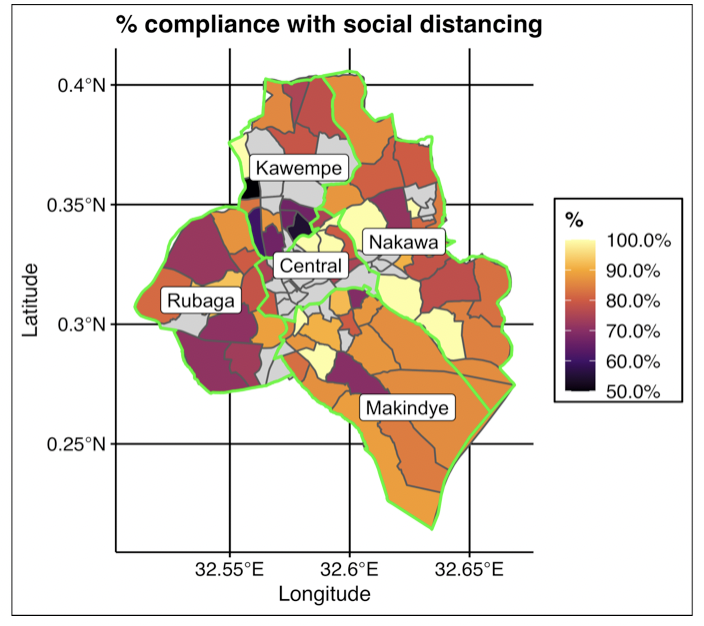RECOVR Roundup Vol. 13: Social Protection in the Time of COVID-19
In this thirteenth installment of our RECOVR Roundup series, we are sharing new findings and analysis from the RECOVR Research Hub and from our partner organizations, as well as links on what is happening in the Social Protection landscape in response to COVID-19. Read the previous installment if you missed it, and sign up for our mailing list if you'd like to receive this roundup series directly to your inbox.
As always, we encourage you to write to our team with ideas for features.
 New Findings & Analysis
New Findings & Analysis
Uganda: How Kampalans’ beliefs and behaviors changed during the pandemic in 2020
A majority of respondents maintained most preventive measures, but perceptions of the country’s management of COVID-19 shifted over time

Before the pandemic began, researchers Macartan Humphreys, Constantin Manuel Bosancianu, and Ana Garcia-Hernandez were running a study with IPA-Uganda, where Kampala residents had the chance to go to meetings with the city government to elicit preferences to construct a Client Charter in Kampala. The study aimed to explore the effects of political participation in social and institutional trust and understand how citizens and consultation facilitators interact in these settings. When COVID-19 hit, they partnered with other researchers—Melina Platas, Leah Rosenzweig, and Lily Tsai—to study how attitudes and behaviors they’d already been measuring were affected by the pandemic and track the same for new pandemic-related behaviors. The researchers have released a dashboard of findings so far over three waves of the study in 2020: While some preventive behaviors, such as wearing a mask outside one’s home, persisted across rounds (87 percent, 92 percent, and 89 percent, respectively), others like social distancing decreased and plateaued (85 percent, 73 percent, and 73 percent, respectively). Respondents’ perceptions and approval of various government institutions’ handling of the crisis fluctuated across rounds: for example, by December, only 30 percent of respondents rated the Ministry of Health’s performance “somewhat good,” compared to 52 percent in June.
Visit the results dashboard here to learn more about the findings.
Indonesia: Is knowledge on preventing COVID-19 enough?
Knowledge and behavior were linked, but information sources and socioeconomic factors also played a role
When it comes to changing behavior, there’s a big difference between knowing what you should do and actually doing it, and the relationship between knowledge and action is… complicated. In the early months of the pandemic (March-May 2020), researchers Eliana Chavarría, Farah Diba, Maja E. Marcus, Marthoenis, Anna Reuter, Lisa Rogge, and Sebastian Vollmer sought to understand the individual-level determinants of disease knowledge and behavior in the context of the COVID-19 pandemic in Aceh, Indonesia. Using data from a representative population sample of 40-70-year olds, they found that levels of knowledge and self-reported protective health behavior were both relatively high and related. For example, 87 percent knew that social distancing can mitigate the spread of the virus, and this knowledge was associated with a 74 percentage point increase in the probability of practicing social distancing (though numbers were lower for masks—with 57 percent knowing, and 37 percent self-reporting use). But knowledge was also associated with socioeconomic factors and information sources, and was lower for less educated, less wealthy, and rural households.
 What We're Reading & Watching
What We're Reading & Watching
- In 2020, the Latin America and the Caribbean region notched the fastest growth of any region for active mobile money accounts (67 percent) and registered mobile bank accounts (38 percent), according to a new study by the Global Systems for Mobile Communications Association. The growth was driven in part by government pandemic relief funds sent via mobile money wallets.
- COVID-19 has been a massive shock to economies and safety nets, but it might not be the last. The Maintains research program has released six analyses and microsimulations on how to make safety nets more resilient and prepare for future emergencies in Bangladesh, Ethiopia, Kenya, Pakistan, Sierra Leone, and Uganda. Among policy recommendations: establish or expand social registry databases, work with community-based organizations and trusted leaders to encourage adoption of digital technologies, and develop disaster risk financing strategies.
- But that’s not to say governments have been idle - in a review of COVID-19 support policies, the World Bank finds that “developing countries introduced an unprecedented social protection and jobs policy response,” with 91 percent of countries providing liquidity support to registered firms, and 71 percent adjusting their labor regulations. Wage subsidies, unemployment benefits, and income tax reductions have also been popular.
- In a new briefing, UNHCR outlines promising social protection responses to include forcibly displaced persons—over 80 million people worldwide—in pandemic economic protections. Recommendations include making administrative processes more flexible to encompass refugees and asylum seekers and expanding access to labor market opportunities.
- A new case study from J-PAL outlines researchers’ experience working with the Government of Chile to design a cash transfer program during the pandemic that has reached over 3 million households.
- IPA recently highlighted results from the second round of our RECOVR survey of the pandemic’s social effects in Rwanda and Zambia, as well as the results of a qualitative study by the Chronic Poverty Advisory Network in Zambia. You can watch the recording here.
 Upcoming Events from the RECOVR Webinar Series
Upcoming Events from the RECOVR Webinar Series
- On April 14th, join researchers from IPA, the Busara Center for Behavioral Economics, J-PAL, and IDinsight as they share their findings on questions related to remote research approaches and data collection during the last year. Register for the webinar here.












